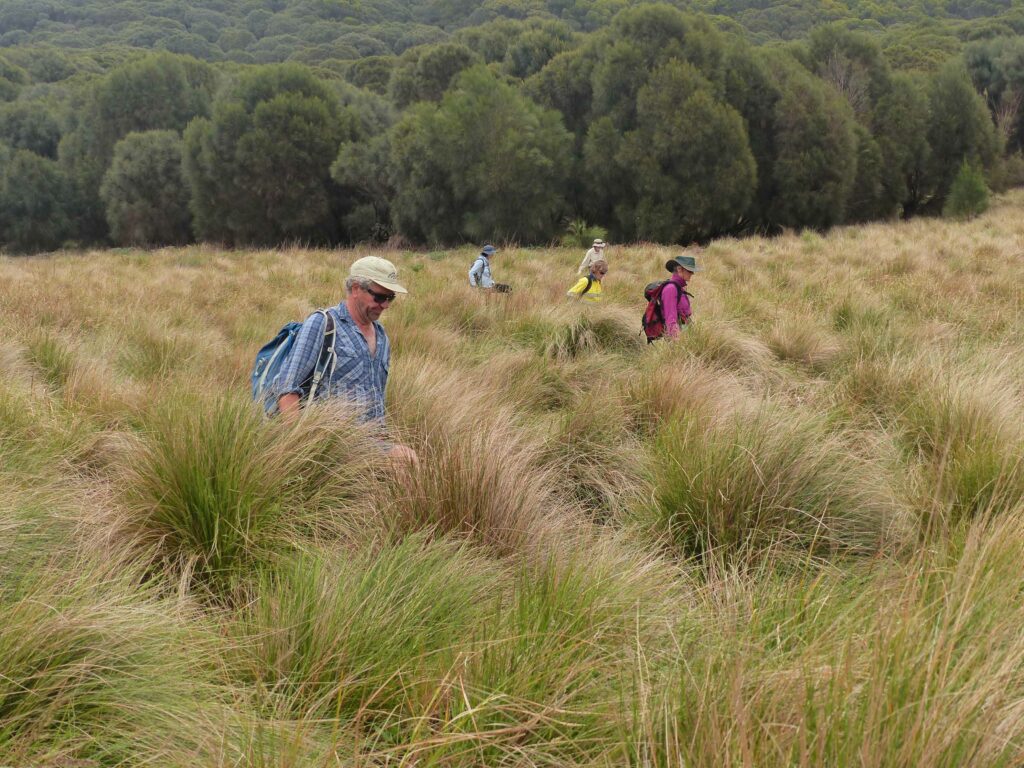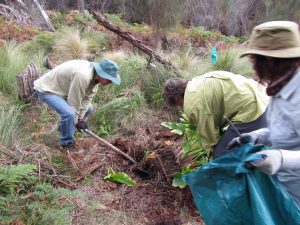Friends of Deal Island – War on Weeds
In 1998, Bush Heritage caretakers on the island commenced a battle with weeds that were posing a threat to the natural values of otherwise tranquil Deal Island. Their efforts were followed by Tas. Parks & Wildlife Volunteer Caretakers and by the Friends of Deal Island who have been conducting working bees since December 2000. Many of the recent Caretakers have been retired PWS employees which helps sustain the strong focus on weed management on the island.
In November 2022, a grant from the Tasmanian Nature Conservation Fund enabled a small FoDI group to fly to Deal Island and continue work on multiple weeds.
Over twelve days:
- All known sea spurge infestations were hand weeded and several new individual plant sites were treated and mapped (approximately 115 hours removing approx 1400 plants)
- Follow up was done on all known Arum Lily sites
- Areas not known to contain ragwort were extensively searched and any plants found, removed and mapped (140 hours used to remove approximately 5000 rosettes
- Some work was done on larger areas of ragwort with the aim of establishing densities suitable for ragwort beetle release in the future) and,
- Over 700 horehound seedlings were removed from known locations.
This effort involved six volunteers who undertook approximately;
- 50 hours planning and coordinating the working bee
- 280 hours of weeding time and,
- 30 hours managing mapping data
- Searching and removal of ragwort in low infestation area. Stuart Dudgeon (foreground) and Jane Davis (middle foreground). Photo by Mike Comfort.
- Sandra James (foreground) searching for and removing sea spurge at Winter Cove. Photo by Mike Comfort.
DID THEY MAKE A DIFFERENCE?
Yes!
- The continued spread of ragwort throughout grasslands on Deal Island has been limited through the minimisation of seed production across extensive areas through thorough searching of low density areas.
- The potential for sea spurge seeding on the island this summer has been greatly reduced with followup on all sites supported by further weeding efforts undertaken by longer term caretakers.
- Flowering horehound plants have been minimal over a number of years. The continued removal of seedlings aids in further reducing the seedbank contained on the island.
- An area above east cove on the western side of Deal Island was significantly denuded of native vegetation throughout the life of the working light station and removal of weeds in this area has continued to allow further establishment of native species.
ACKNOWLEDGMENTS
- Wildcare Tasmania, through Friends of Deal Island, maintain a supply of tools, chemicals and safety equipment that is utilised on working bees.
- Flinders Island Air Charter continues to provide an efficient service of delivering volunteers to the island when weather windows present themselves.
- The Tasmanian Parks and Wildlife Service continue to assist through providing working bee materials, accommodation on the island, safety briefings, and staff time to further the environmental works on the island.
- Wildcare promotion is undertaken each year during the wooden boat festival where volunteers run a stall promoting island volunteer groups and their works.
- Removing arum lilies
Friends of Deal Island aims to promote better management outcomes with regard to the National Park and undertakes practical projects concerning both the cultural and natural heritage of Deal Island through working bees and fundraising.
Click this link to stay in touch with news and opportunities!



